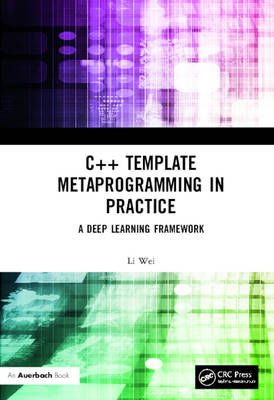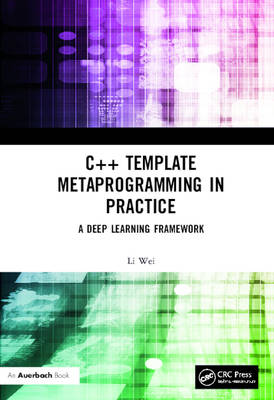
- Afhalen na 1 uur in een winkel met voorraad
- Gratis thuislevering in België vanaf € 30
- Ruim aanbod met 7 miljoen producten
- Afhalen na 1 uur in een winkel met voorraad
- Gratis thuislevering in België vanaf € 30
- Ruim aanbod met 7 miljoen producten
Omschrijving
Using the implementation of a deep learning framework as an example, C++ Template Metaprogramming in Practice: A Deep Learning Framework explains the application of metaprogramming in a relatively large project and emphasizes ways to optimize systems performance. The book is suitable for developers with a basic knowledge of C++. Developers familiar with mainstream deep learning frameworks can also refer to this book to compare the differences between the deep learning framework implemented with metaprogramming and compile-time computing with deep learning frameworks using object-oriented methods.
Consisting of eight chapters, the book starts with two chapters discussing basic techniques of metaprogramming and compile-time computing. The rest of the book's chapters focus on the practical application of metaprogramming in a deep learning framework. It examines rich types and systems, expression templates, and writing complex meta-functions, as well as such topics as:
- Heterogeneous dictionaries and policy templates
- An introduction to deep learning
- Type system and basic data types
- Operations and expression templates
- Basic layers
- Composite and recurrent layers
- Evaluation and its optimization
Metaprogramming can construct flexible and efficient code. For C++ developers who are familiar with object-oriented programming, the main difficulty in learning and mastering C++ metaprogramming is establishing the thinking mode of functional programming. The meta-programming approach involved at compile time is functional, which means that the intermediate results of the construction cannot be changed, and the impact may be greater than expected. This book enables C++ programmers to develop a functional mindset and metaprogramming skills. The book also discusses the development cost and use cost of metaprogramming and provides workarounds for minimizing these costs.
Specificaties
Betrokkenen
- Auteur(s):
- Uitgeverij:
Inhoud
- Aantal bladzijden:
- 308
- Taal:
- Engels
Eigenschappen
- Productcode (EAN):
- 9780367609566
- Verschijningsdatum:
- 2/12/2020
- Uitvoering:
- Hardcover
- Formaat:
- Genaaid
- Afmetingen:
- 178 mm x 257 mm
- Gewicht:
- 748 g

Alleen bij Standaard Boekhandel
Beoordelingen
We publiceren alleen reviews die voldoen aan de voorwaarden voor reviews. Bekijk onze voorwaarden voor reviews.











